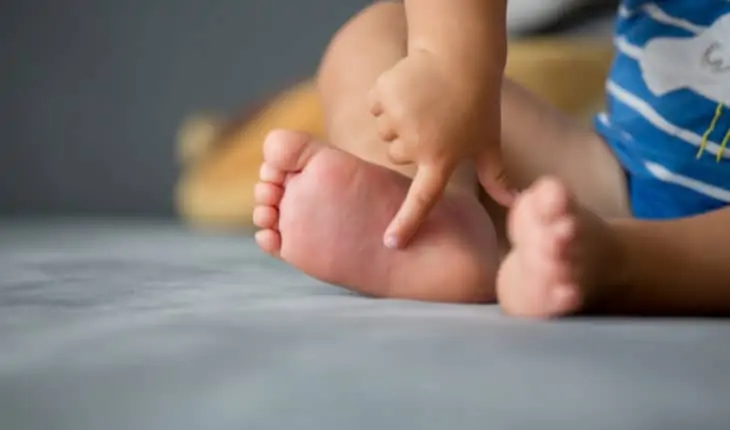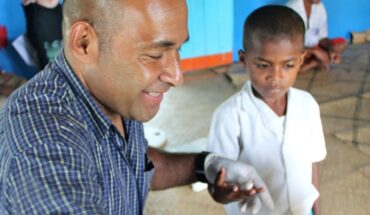Summer sickness: Dr Luke James, Medical Director, Bupa Global and UK Insurance discusses how to protect your child’s health over the summer.
We all want the summer months to be a time of fun and laughter for the whole family, especially as restrictions begin to ease. However, health issues in children during the spring and summer are more common than you might think. From hay fever to chickenpox, it’s important to be aware of common health issues, and how to combat them. Here Dr Luke James – Medical Director for Bupa Global and UK Insurance – shares six common illnesses to watch out for, and tips to prevent your little ones from getting ill this summer.
Hand, foot and mouth disease
Hand, foot and mouth disease is a common childhood viral illness. It causes blisters on your hands and feet, and ulcers in your mouth, however these are generally mild, and most children recover within a few weeks.
Hand foot and mouth disease is extremely contagious – you can catch and spread it easily. The most common time to catch it is late summer and early autumn, with children under 10 (especially those under four) at the highest risk. Anyone can catch hand, foot, and mouth; however, most adults will have had contact with the disease as a child and will already be immune.
Symptoms of the disease include a fever, sore throat, cough and pain in your tummy for the first few days. As the virus progresses, you will develop blisters or ulcers in your mouth, as well as blisters on your hands and feet.
Hand, foot and mouth disease is often spread in nurseries or schools, and you won’t usually need to see your doctor if you get it, however if your child is becoming more unwell, it’s important to contact your GP for advice. Make sure your child drinks enough fluids to prevent dehydration and remember that painkillers can help to relieve symptoms, too.
Hay fever
During the last year’s restrictions, we’re likely to have spent more time indoors than we usually would. As a result, you may have been exposed to less pollen, and this could make your hay fever worse. We build up a certain level of immunity to pollen as we spend time outside, so you may be less immune than you usually would to pollen.
Hay fever usually consists of symptoms such as itchy, watery eyes and sneezing. It can sometimes be confused with a viral infection, but you can tell the difference between the two by how long your
child’s symptoms last. If your child has a constant runny nose and is sneezing every day for part of the year but not in the winter, it may be a sign that they are allergic to something. If it is a virus, the symptoms should only last for a week or two.
With restrictions eased, it’s likely you’ll be spending more time outdoors. Grass and tree pollen are highest around this time of the year (May to July), so it’s important to be prepared. Firstly, before you head outside, check the pollen count – if it’s particularly high, you can take precautions to reduce your family’s exposure. You can check your local area’s pollen count on the Met Office forecast.
Your clothing and hair can all carry pollen. To reduce your symptoms, take a quick shower and change your clothes after spending time outside. When you wash your clothes, avoid drying them outside on the washing line – use an indoor drying rack instead.
One of the best ways to manage allergies in lockdown is to be prepared, and ensuring you have the right medicine and enough supplies can help. There are many different medicines for hay fever, including tablets, nasal sprays, and eye drops. Speak to your local pharmacist about the type of medicine that’s best suited to your child’s needs.
Heat rash
There are lots of causes of rashes in babies and children, and they’re often nothing to worry about. If your child develops a heat rash, they will likely develop tiny bumps on their body that are surrounded by red skin. A heat rash isn’t typically painful; however, it can be itchy.
In infants, a heat rash usually develops first on the neck, armpits, and groin area. It can also occur on the chest and back, but this is most common in older children.
Hot, humid summer weather, physical activity, overdressing, and sleeping under too many layers can all increase your family’s risk of heat rash. If your child develops a heat rash, avoid using any lotion, oils, or treatments on the skin. Instead, make sure they’re out of the heat and sat in a cooler area. Make sure any extra clothing is removed, too. You should use a cool, damp wash cloth on your child’s skin to ease any itchiness.
Speak to your doctor if your child has a heat rash for a few days, or if they develop a fever, chills, or swelling around the infected area. You can prevent heat rash by dressing your child in light, cotton clothing if it’s a particularly hot day, and ensure they’re drinking enough to avoid dehydration.
Gastroenteritis
Gastroenteritis is a common condition that triggers diarrhoea, sickness and tummy pain. It’s usually caused by an infection and most people get better after a few days. Anyone can get gastroenteritis.
If your child has diarrhoea (one of its most common symptoms), this usually lasts for up to a week or, occasionally, two weeks. If they’re being sick, this usually lasts for two to three days. If your child’s symptoms are very bad or not getting any better, or if they seem generally unwell, call your GP surgery for advice.
Gastroenteritis can make babies and children get dehydrated very quickly, which can be dangerous. If your child is unable to keep any fluids down, is peeing less, has a dry mouth or sunken eyes, it’s important to speak to your doctor. You should also speak to your doctor if your child is unable to keep any fluids down, has a high temperature, or blood in their diarrhoea.
Stay off work, school, or nursery until at least 48 hours after the symptoms have passed. During this time, make sure you and your child wash your hands frequently and thoroughly with soap and water, particularly after using the toilet and before preparing food.
Chickenpox
If you’re a parent, you’re likely to deal with chickenpox at some point. You can catch chickenpox at any time of the year, but the infection is most common in the spring months.
For most people, chickenpox isn’t serious. It is most common in young children and causes an itchy rash with small blisters and can make you feel unwell. It’s spread easily through the air when you cough, sneeze, or if you touch infected surfaces or blisters. If you’ve not had chickenpox before and someone in your household gets it, it’s very likely you’ll catch it too – regardless of your age.
If a young child has chickenpox, you’ll usually be able to manage the symptoms at home, without seeking medical help. You’ll probably be able to tell it is chickenpox because it causes such a distinctive rash. However, if you’re unsure, speak to your doctor, as they’ll be able to help.
If you or your child is generally fit and healthy, you’ll usually recover from chickenpox without any specific treatment. Chickenpox spots can be extremely itchy, so make sure you stock up on some topical ointments to help soothe your child’s skin. An antihistamine, such as chlorphenamine, may also help with the itching. Try not to scratch your spots as much as possible, as this can make them infected or lead to scarring. You might want to put mittens on young children overnight to reduce scratching.
You can also take paracetamol if you have any pain or a fever, but don’t take non-steroidal anti-inflammatory drugs (such as ibuprofen) for chickenpox, as these medicines can cause a serious skin infection in children and adults with chickenpox. Always read the patient information leaflet that comes with your medicine, and if you have any questions, ask your pharmacist for advice.
Tooth decay
As parents, we’ve all been there with little ones asking for snacks and sugary drinks – and we’ve all given in, but certain foods and beverages can take their toll on children’s teeth.
Every child is at risk of tooth decay, so it’s important to know how to prevent it. Around school age, children will want to start brushing their own teeth, but until the age of seven or eight, we would advise an adult still helps and guides them.
Practicing good oral care early on sets patterns for life. So, make sure your child brushes their teeth twice a day and attends all their regular dental appointments.
How to prevent illnesses this summer:
Practice good hygiene
Hand washing is one of the most important things we can do to protect ourselves and others from viruses. Even if they look clean, your hands can still carry many germs. That’s why cleaning hands regularly and effectively is so important.
Encourage a healthy, balanced diet
Aim to eat at least five portions of fruit and vegetables each day. Fruit and vegetables contain a lot of essential vitamins and minerals, which help to keep you healthy and your body working properly. They’re also a good source of fibre. It’s a good idea for the whole family to eat a wide range of different types and colours of fruit and vegetables to get all the nutrients you need, all year-round.
Your five portions of fruit and vegetables don’t all have to be fresh – dried, frozen, tinned, and juiced fruit and vegetables count, too.
Keep yourself well
Don’t underestimate the importance of staying well and healthy yourself – the healthier you are, the healthier your child is likely to be. Make sure you regularly exercise, eat a well-balanced diet and get enough sleep.
Understand the rules
Although this may seem obvious, being aware and understanding any coronavirus rules and restrictions will help you to protect your health, especially as we navigate our way out of lockdown. Everyone is dealing with coming out of lockdown in their own way, but make sure to follow the current guidelines, as they are there to protect us all.
- Summer sickness – 6 common illnesses - 24th May 2021







